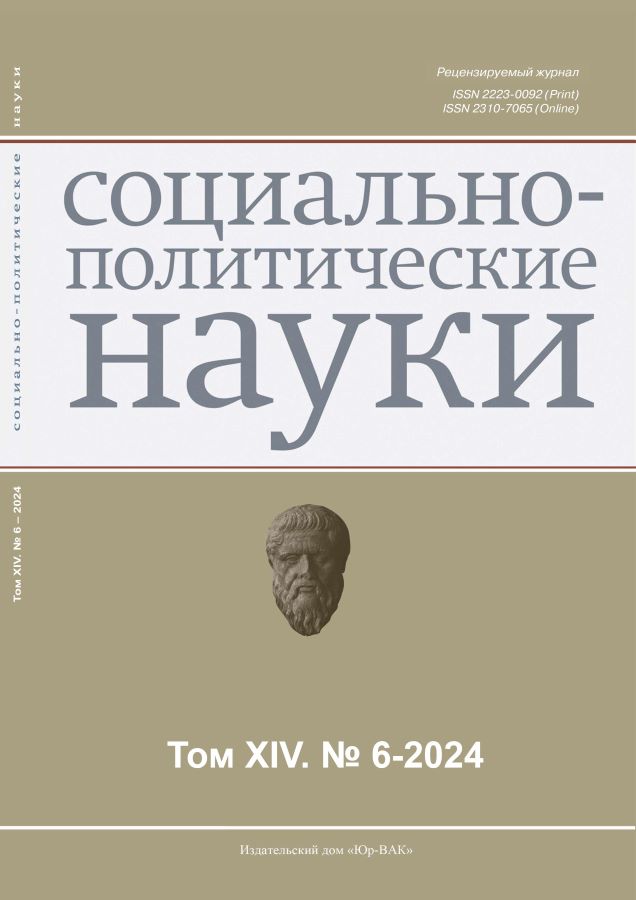Institutional approach in the study of political risks
- 作者: Panesh K.M.1
-
隶属关系:
- State Duma of the Federal Assembly of the Russian Federation
- 期: 卷 14, 编号 6 (2024)
- 页面: 46-51
- 栏目: Political Institutions, Processes and Technologies
- URL: https://journals.eco-vector.com/2223-0092/article/view/653974
- DOI: https://doi.org/10.33693/2223-0092-2024-14-6-46-51
- EDN: https://elibrary.ru/CXTWZC
- ID: 653974
如何引用文章
详细
The subject of this article is the institutional approach in the study of political risks and its justification in the context of the development of state institutions. It is noted that the moment of society’s susceptibility to risks is generated within society, thus being a direct result of social practice. The factors that determine the range of possibilities of political power to carry out regulatory activities are highlighted. The author substantiates the relationship between society and public administration institutions. The integration of the managerial functions of the main state institutions is associated with ensuring the effectiveness of management in conditions when political risk factors are the responsibility of various departments, or we are talking about systemic risks associated with the mismatch of various subsystems of society. At the level of existing socio-political institutions, the integration of authorities to counter significant risk factors is implemented within the framework of the creation of special functional institutions – coordination centers, including representatives of authorities, whose combined efforts are necessary to resolve the acute problem that has arisen. It is concluded that it is necessary to create favorable conditions for the organization of “horizontal” interaction between various authorities and outside the structure of coordination centers, which cannot be organized for each specific problem.
全文:
作者简介
Kaplan Panesh
State Duma of the Federal Assembly of the Russian Federation
编辑信件的主要联系方式.
Email: panesh_kaplan@mail.ru
SPIN 代码: 7735-6661
Cand. Sci. (Econ.), deputy
俄罗斯联邦, Moscow参考
- Alklychev A.M. Pricing during the transition to a market economy. Moscow: Institute of Economics, 1995. 145 p.
- Bogdanov A.A. Tectology. General organizational science. Moscow: Economica, 1989.
- Bulavina M.A., Novoselsky S.O. Prospects for Russia’s military security in the current geopolitical environment. In: Interstate confrontation in the context of globalization and its impact on the management of the national defense of the Russian Federation. Moscow, 2023. Pp. 105–112.
- Gaskov D.V. Separation of powers and institutions of power. Bulletin of Science and Education. 2019. No. 11-3 (65). Pp. 60–62. (In Rus.)
- Goffman A.B. Solidarity or rules, Durkheim or Hayek? On two forms of social integration. In: Social solidarity and altruism: Sociological tradition and modern interdisciplinary research. Collection of scientific papers. D.V. Efremenko (ed.). Moscow, 2014. P. 16. (Series “Theory and history of sociology”)
- Dondokov Ts.S., Kuzhikov D.A. The concept of the principle of separation of powers: Historical and legal aspect. Bulletin of ZabSU. 2014. No. 7. Pp. 148–154. (In Rus.)
- Durkheim E. Suicide. Sociological etude. St. Petersburg, 1912.
- Kalinenko N.L. Import substitution and technological sovereignty. Education and Law. 2023. No. 11. Pp. 87–91. (In Rus.)
- Maksimovich A.V. Forecasting methodology and social risk management strategies. Public and Municipal Administration. Scientific Notes. 2023. No. 4. Pp. 223–229. (In Rus.)
- Novoselsky S.O., Moiseeva O.A., Filippova O.A. Communication policy of executive authorities with the population in social networks. Political Science Issues. 2023. Vol. 13. No. 3 (91). Pp. 1001–1013. (In Rus.)
- Tkhabisimova L.A. Optimization of the state government system: The principle of separation of powers. Jurist-Pravoved. 2007. No. 1 (20). Pp. 53–56. (In Rus.)
- Shinyaeva O.V., Kayumova L.Kh. Dialogue between the government and the population in the context of the formation of civil society. News of Higher Education Institutions. Volga Region. Social Sciences. 2014. No. 1 (29). Pp. 80–90. (In Rus.)
补充文件








